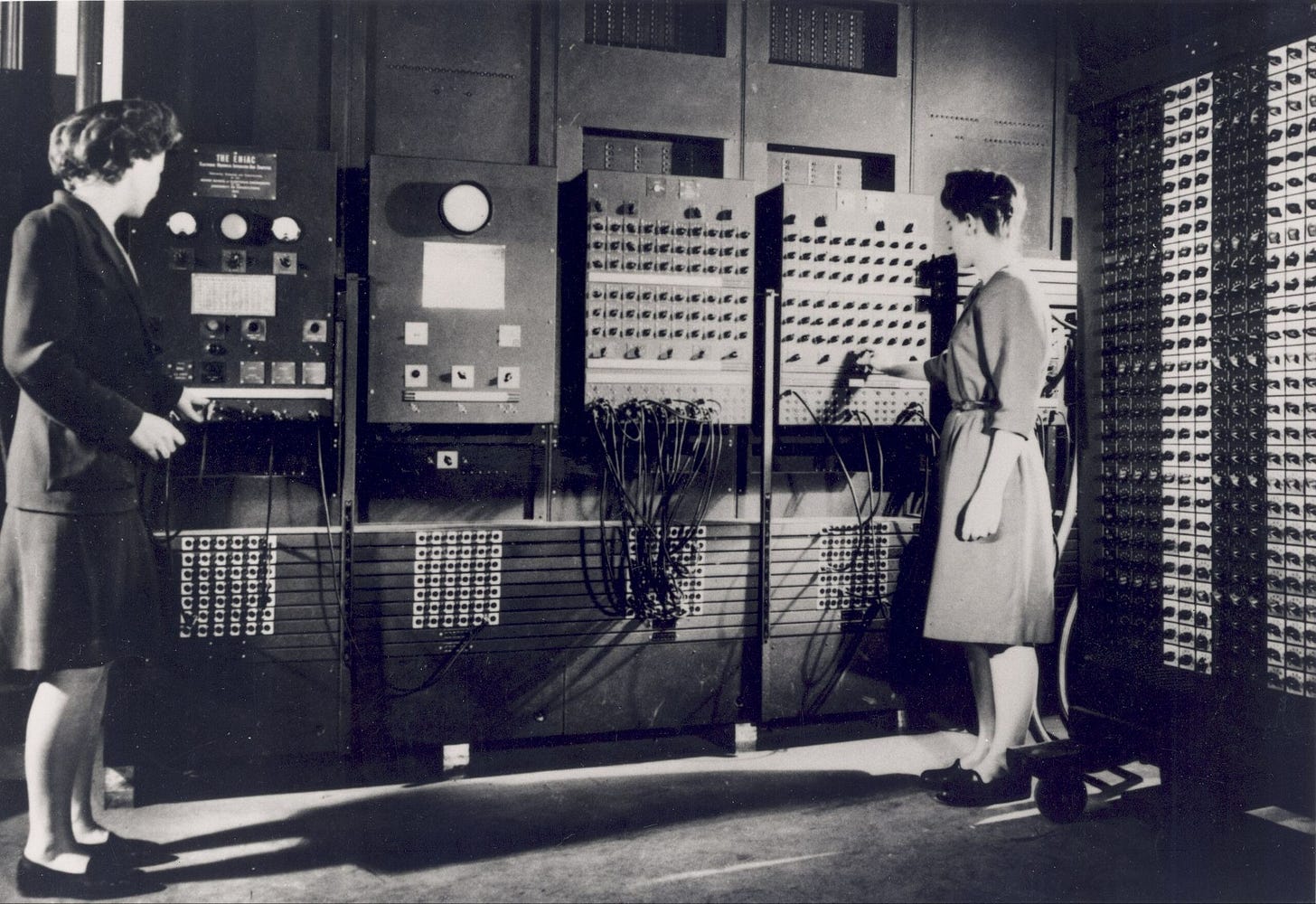From Computers to Programmers, to the New AI Architects
What history can tell us about the evolution of the software profession.
Before digital computers were invented, “computer” referred to an occupation whose job was doing industrialized arithmetic. Teams of people, often women, worked in an assembly line manner where the calculation was divided so that it could be done in parallel. Human computers used tools as well - slide rules, worksheets, lookup tables, etc, but in general, the work was tedious and mechanical, and apparently, these were not high-salary jobs.
When the digital computers came, the most skillful human computers became the first generation of programmers. Quickly, human computers became one of the obsolete occupations. Fast forward to the 21st century, there are way more programmers than there were human computers. Programmers are being paid much more as well, because firstly, it requires more training and skills than human computers and secondly, digital computers unlock so many opportunities that programmers are in great demand.

With the emergence of various GenAI software engineering tools, is history going to rhyme? Is programming becoming an obsolete occupation, replaced by AI architects that gets higher pay and is in even greater demand?
While programming is not a low-pay job, we all know a huge chunk of a programmer’s daily job is either repetitive work, or work that one already knows the end state of before they even start. By helping people get rid of those repetitive and deterministic work, AI can liberate them to a new type of work that requires more creativity and higher cognitive skills, similar to the transition from computers to programmers.
The question then becomes, is there going to be a large amount of demand for such AI architects? Where is the demand coming from?
For most of us, it is hard to be convinced of a “yes” answer to the first part of the question. What we are seeing is waves and waves of tech layoffs. What’s more, continuous improvements of LLMs seem to be on track to eliminate the vast majority of human jobs forever.
People who believe that machines will replace human labor believe exponential growth of machine capability is going to surpass humans and pass humans much sooner than most people can expect. I am bothered by this viewpoint because while it applies a “growth mindset” to machines, it doesn’t apply that same mindset to humans. Through acquisition of new knowledge & tools, human intelligence has been growing exponentially throughout history without needing to replace our hardware. On a personal note, I can confidently say that I am way smarter than my parents in today’s economically valuable tasks, and I am smarter than my past self when LLM chatbots were not available.
If history is going to give us any hint, we should note that hardly anyone would have foreseen such a great demand for programmers in the early days of digital computers - it is estimated that there were 47 million software developers worldwide as of early 2025. If the same story happens to the new AI architects, we shouldn’t feel surprised at all. Anyway, it is much easier for us to notice existing jobs being taken away; it is much harder to notice new jobs being created, especially when those jobs are in a messy infant state.
Where could the demand for the AI architects come from? As I mentioned in my earlier post The First Chapter of Content Creation with GenAI, the true power of new technology like AI doesn’t come from making cheap things cheaper, but from making prohibitively expensive things accessible. Because they are prohibitively expensive today, their scale is small, which makes them look unimportant. The true size of their opportunities will only be unleashed once they become more accessible.
One such area might be projects that require multi-disciplinary collaborations, like AlphaFold. Such projects are very expensive today because you need to gather experts from different fields to work together, and thus only large institutions can afford them. With the help of vast knowledge from AI, an AI architect might be able to quickly learn just enough about all the disciplines involved to pull such projects off.
Before the breakthrough in AI in the past few years, the tech industry felt quite dead - there were barely any new directions that are big and promising; more and more programming jobs are about helping established businesses build stronger moats. While there are pains, we should probably all appreciate that the new technology has revived the tech industry. AI’s true impact will not be in making today’s programming cheaper, but in making tomorrow’s challenges - the next AlphaFolds - affordable and accessible. We are probably witnessing the end of the programmer; but we are also witnessing the difficult, messy birth of their bigger, more successful successor.

